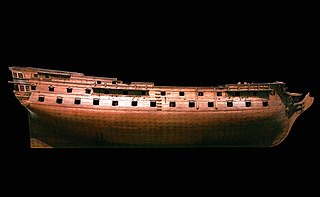
Vendée is a department in the Pays de la Loire region in Western France, on the Atlantic coast. In 2019, it had a population of 685,442. Its prefecture is La Roche-sur-Yon.

Jean-Baptiste Perrée was a French Navy officer and Rear-admiral.

Count Toussaint-Guillaume Picquet de la Motte, also known as La Motte-Picquet was a French Navy officer and admiral. Over a career spanning 50 years, he served under Louis XV and Louis XVI and took part in 34 campaigns. He fought in the Seven Years' War and in the Naval battles of the American Revolutionary War, earning the ranks of Commandeur in the Order of Saint Louis in 1780, and of Grand Cross in 1784. He died during the French Revolution.

The Society of Foreign Missions of Paris is a Roman Catholic missionary organization. It is not a religious institute, but an organization of secular priests and lay persons dedicated to missionary work in foreign lands.

The French expedition to Korea was an 1866 punitive expedition undertaken by the Second French Empire against Joseon Korea in retaliation for the execution of seven French Catholic missionaries. The encounter over Ganghwa Island lasted nearly six weeks. The result was an eventual French retreat, and a check on French influence in the region. The encounter also confirmed Korea in its xenophobia and isolationism for another decade, until Japan forced it to open up to trade in 1876 through the Treaty of Ganghwa.
Events from the 1230s in England.

The Terrible was a 110-gun ship of the line of the French Navy, lead ship of her class.

Jean Bart was a Téméraire class 74-gun ship of the line of the French Navy.

The Saint-Esprit was an 80-gun ship of the line of the French Navy, lead ship of her class. She was funded by a don des vaisseaux donation from the Order of the Holy Spirit, and named in its honour.

Surveillante was an Iphigénie-class 32-gun frigate of the French Navy. She took part in the Naval operations in the American Revolutionary War, where she became famous for her battle with HMS Quebec; in 1783, she brought the news that the war was over to America. She later took part in the French Revolutionary Wars, and was eventually scuttled during the Expédition d'Irlande after sustaining severe damage in a storm. The wreck was found in 1979 and is now a memorial.

France–South Korea relations have spanned over a period from the 19th century to the present. In 2016, France and Korea celebrated the 130th anniversary of diplomatic ties between the countries.

Pierre Henri Dorie (1839–1866) was a French missionary of the Paris Foreign Missions Society, who was martyred in Korea in 1866. His feast day is 7 March, and he is also venerated along with the rest of the 103 Korean Martyrs on 20 September.

The Vengeur was a 64-gun ship of the line of the French Navy designed by Antoine Groignard. She saw action with Bailli de Suffren during the American War of Independence.

Cybèle was a Nymphe-class 40-gun frigate of the French Navy.

Marie-Nicolas-Antoine Daveluy was a French missionary and saint. His feast day is March 30, and he is also venerated along with the rest of the 103 Korean martyrs on September 20.
Andromaque was a 32-gun Nymphe-class frigate of the French Navy.
The action of 18 June 1799 was a naval engagement of the French Revolutionary Wars fought off Toulon in the wake of the Mediterranean campaign of 1798. A frigate squadron under Rear-admiral Perrée, returning to Toulon from Syria, met a 30-ship British fleet under Lord Keith. Three ships of the line and two frigates detached from the British squadron, and a 28-hour running battle ensued. When the British ships overhauled them, the French frigates and brigs had no choice but to surrender, given their opponents' overwhelming strength.

The Kien Chan was a Chinese-built ship, originally named Toey-Wan, purchased by the French Navy in 1860 and commissioned as an aviso.

Guerrière was a sail and steam Dryade-class frigate of the French Navy. She is known as the flagship of Admiral Pierre-Gustave Roze during the French campaign against Korea in 1866.
Albert Édouard Le Brethon de Caligny was a French Navy officer and founder of the Ever Victorious Army.















